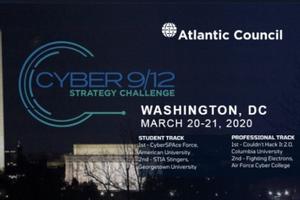Achievements
SPA Team Wins Cybersecurity Competition

AU School of Public Affairs (SPA) students won a recent cyber policy and strategy competition, beating 13 teams from other area colleges and universities.
The four-person team of Crystal Assenmacher, SPA/BA ’20, CAS/BS ’20; Matt Boey, SPA/MS ’21; Gabriel Cash, SPA/MS ’20; and Kristen Garfield, SPA/MS ’20 took top honors at the Atlantic Council’s Cyber 9/12 Strategy Challenge on March 20-21.
At the annual competition, collegiate and professional teams develop proposed recommendations to tackle a fictional international cyber catastrophe. The scenario becomes more complex with each round; the group is judged on its responses to these changing dynamics, presented through written briefs and presentations.
The AU team formed in the fall and first competed at Columbia University last semester. This year’s event, originally scheduled to take place on the AU campus, evolved into virtual sessions because of the COVID-19 school closure.
“They took everything they learned from their experience in New York and their hard work paid off,” said SPA Executive in Residence Sasha O’Connell, who coached the team. “It’s really exciting -- especially in these unusual circumstances, it’s a bright spot.”
The cyber competition, open to students from across academic disciplines, provides participants with a deeper understanding of how to manage tradeoffs during a cyber crisis. Since its establishment in 2012, the competition has expanded its reach globally, with regional competitions across the United States, as well as in London, Geneva, Canberra, and Lille. The events give students a chance to meet expert mentors and high-level cyber professionals while developing practical skills in policy analysis and presentation.
“The team was energized and collaborative, doing a nice job of working well together even though they were presenting remotely,” O’Connell said. The judges applauded the AU group for being adaptable and incorporating their feedback into each round.
O’Connell credits Assenmacher, an undergraduate studying political science and computer science, with suggesting SPA create a team, and with recruiting three graduate students to join.
“I thought it would be a very interesting way to apply my technical skills in computer science to policy -- and cyber policy is close to an intersection between the two,” said Assenmacher, who learned about the competition through the Association for Computing Machinery Club on campus.
To prepare for the competition, the students met for a few hours weekly to read scholarly articles, review resources on how to write professional briefings, and polish their presentation skills. This year’s event required the students to devise plans in reaction to a cyberattack on international ports and shipping, using their military, legal, technical, and policy backgrounds.
“You have to take all this information and pull something out of it in a short amount of time. I think it’s valuable to put those skills and quick thinking to good use,” said Assenmacher, who would like pursue a career in the intelligence community. “Working as a team was really fun and this is almost an exact simulation of what it’s like in the field…. I hope this competition prepares me for my next step.”
The first-place prize is a scholarship for the four students to attend a conference sponsored by the Atlantic Council in Brussels, Belgium, this summer.

